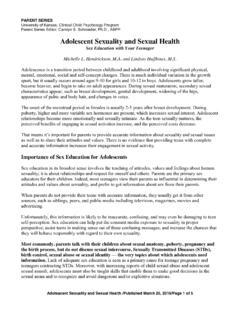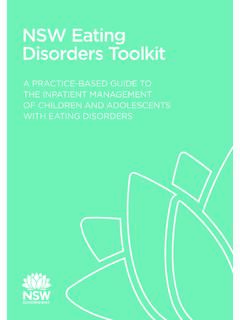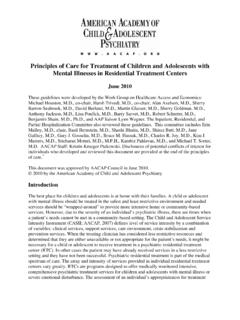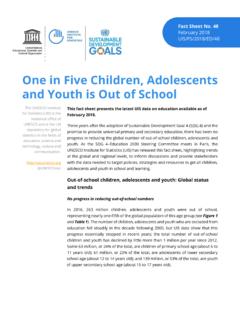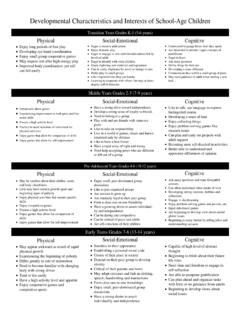Transcription of Depression in Children and Adolescents
1 PARENT SERIES University of Kansas, Clinical Child Psychology Program Parent Series Editor: Carolyn S. Schroeder, , ABPP Sexual Health and Sexual Assault Prevention/Published March 25, 2016/Page 1 of 5 Depression in Children and Adolescents Jonathan L. Poquiz, and Andrew L. Frazer, Many people believe only adults can have Depression , but Children and teenagers can also be affected by Depression . About 11 percent of teens experience Depression before age 18. Depression is more than just bad moods and occasional feelings of being down or sad. Those feelings are normal in Children , and especially teenagers. When faced with major disappointments or setbacks, people feel sad, but the sadness usually lessens with time. Parents should be concerned when sadness lingers for weeks, months or longer and limits a child s or teenager s ability to function.
2 Symptoms of Depression can be hard to spot in Children . Children may show different symptoms at different ages, and throughout adolescence. What Depression Looks Like at Different Ages Age Behaviors Precursors Preschoolers (Ages 2-5) x Anger, irritability, tantrums x Excessive crying, sad expressions x Loss of interest in favorite toys/activities x Complains of physical symptoms like stomachaches and headaches x Family history of Depression and mental illness x Family history of suicidal ideation and attempts x Family stressors such as divorce, loved one s death x Chronic, physical illness Middle Childhood (Ages 6-12) Behaviors listed above, and: x Prefers to be alone rather than with family or friends x Bullying, or being bullied x Sleep problems x Eating problems such as no appetite, weight-loss x Difficulty concentrating x Separation anxiety from caregiver x Refusing to attend school x Poor school performance x Thoughts of worthlessness, hurting oneself Precursors listed above, and: x Low parent/peer social support x Inconsistent parenting x Bullying, or being bullied x Social isolation/rejection x High academic pressure x Other mental illnesses such as anxiety*, learning disorders, substance abuse Adolescence (Ages 13-18) Behaviors listed above, and.
3 X Feels hopeless or pessimistic about their future x No interest and enjoyment in activities x Low self-esteem and self-worth x Runs away from home x Substance abuse x Thinks, plans or attempts to hurt oneself Precursors listed above, and: x Onset of puberty x Parent-child conflict due to increased independence *It is not uncommon for Children with anxiety disorders to be diagnosed with Depression as well. Depression in Children and Adolescents /Published March 25, 2016/Page 2 of 5 Preschoolers (ages 2-5) Preschoolers have difficulty verbalizing their emotions, so parents often miss the earliest signs of Depression . However, it is important for parents to recognize that behaviors such as irritability, crying and physical complaints persisting for weeks and even months can be due to Depression .
4 Research has shown that preschool Depression can lead to other mental health illnesses in childhood and adolescence. Middle Childhood (ages 6-12) As the ability to talk about feelings increases, Children begin showing symptoms similar to those in adults. However, the younger Children in this age-range may still have difficulty expressing their feelings, so they can also exhibit behaviors similar to preschoolers. It s important to note that more serious symptoms may show up in this age range, such as thoughts of hurting oneself I would be better off dead, I wish I wasn t here anymore, I m no good to anyone anymore for instance. If you hear your child share any of these thoughts, seek services as soon as possible. Adolescence (ages13-18) The risk of Depression markedly increases with puberty.
5 Since adolescence is a time for teens to be more involved in activities, and be more independent, warning signs of Depression can involve friendships and thoughts of the future. Again, if you hear or see your teen share more serious behaviors, such as substance abuse or suicidal thinking, seek services for him or her as soon as you can. Problems Associated with Depression While Children at different ages may exhibit Depression with different behaviors, it s important to note that they can t just snap out of it. Left untreated, Depression can lead to poor school performance, bad friendships, and other mental health problems like delinquency, substance abuse or even suicide. School and Academic Problems Behaviors that can impact learning include loss of motivation and interest, poor concentration, and sense of worthlessness.
6 For example, a depressed child may be too distracted by depressive thoughts, or may lack the energy to concentrate on schoolwork. Additionally, depressed Children or Adolescents may get negative and unwanted attention from teachers or friends, fueling feelings of worthlessness, which affects their engagement in school. Your child may have some ups and downs in his or her school performance that could be explained by factors like stressful events including moving, parental divorce or even just the normal difficulties and frustrations of learning. However, it should always be cause for concern when you notice a decline in your child s academic performance with no clear explanation. Peer Relationship Problems Having positive and healthy friendships are an important part of growing up.
7 Such relationships promote positive behavior and emotional adjustment. Depression in Children and Adolescents /Published March 25, 2016/Page 3 of 5 Depressed Children , especially if they exhibit aggressive behavior, are more likely to be rejected or avoided by their friends. This rejection can isolate them,and result in relationships with peers who engage in negative behaviors such as drug use. Furthermore, because depressed Children are more likely to be rejected by their peers, they are at higher risk of being bullied, which can perpetuate depressive thoughts and feelings. Likewise, peer rejection and bullying can lead to Depression . That s why it s important for parents to be aware of their Children s social relationships. Self-Harming and Suicide For parents, no fear compares to that of their child or adolescent being at risk for suicide.
8 Suicidal thoughts are not uncommon in Adolescents . About one in 10 Adolescents contemplated suicide at some point in the past year. Research has also shown one out of 10 Adolescents reported having attempted suicide, but rates of completed suicides are rare. That said, take seriously any and all expressions of suicidal behavior. Parents should know the risk factors of suicidal behaviors. One of the primary risk factors of suicide is the presence of mental health disorders, particularly Depression . As a parent, be particularly mindful of: x Persistent low mood, pessimism, and hopelessness x A preference to be alone, withdrawing from family and friends x Pronounced anxiety: some youths, particularly those younger than Adolescents , may exhibit depressive symptoms that look similar to anxiety.
9 Be aware if your child has sudden anxiety, such as being clingy, nervousness, or reporting physical complaints like headaches and stomachaches without an obvious explanation for the behavior. Dealing with Suicide What can parents do? x Be aware. Look out for warning signs, and trust your instincts. x Take it seriously. ALL suicide threats and attempts must be taken seriously. x Get involved. Be emotionally and physically available to your Children . Help them process and understand their feelings. Don t be afraid to ask if your child is thinking about suicide. Get specific about their thoughts, and find out if there s a plan. Using the word suicide or even bringing up the topic of suicide will NOT increase the chances that your child will attempt suicide.
10 X Do not leave your child alone. Safeguard the area. Closely monitor your child and remove anything your child could use to hurt himself or herself, such as medications, sharp objectsor guns. x Seek professional help. Take your child for an immediate evaluation at the nearest emergency room, or call 911. Seek out professional treatment and be your child s advocate. Multiple research studies have found that a combination of both psychotherapy and medication works best to treat Depression . Research evidence also emphasizes that early intervention may be effective in reducing the probability of future mental health problems such as anxiety or substance abuse. Depression in Children and Adolescents /Published March 25, 2016/Page 4 of 5 Seeking Professional Help It s not only important to find professional help; it s just as important to find the right fit between the professional and your child.

